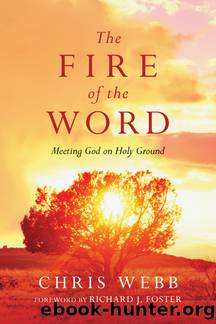The Fire of the Word by Webb Chris;Foster Richard J.;

Author:Webb, Chris;Foster, Richard J.; [Webb, Chris]
Language: eng
Format: epub
Publisher: InterVarsity Press
Published: 2011-11-02T00:00:00+00:00
The Practice of the Presence of God
Once we have begun to develop the skill of attentiveness, we can move on to another more fruitful exercise, often known as practicing the presence of God.
A little background might be helpful here. One winterâs day in the early years of the seventeenth century a young man named Nicholas from Hériménil, in the French Duchy of Lorraine, stood contemplating a tree. Shivering in the cold air, he became fascinated as he studied the dry, barren branches. The tree gave every appearance of being dead. No movements, no fruit, no leaves. It seemed to reflect the bitter lifelessness of the snow-covered earth surrounding it. And yet, Nicholas reflected, it was far from dead. Buried in the heart of this treeâand the dozens of trees around it, and every meadow plant and hedgerow shrubâwas an irresistible gift of life which would soon burst forth in fertile splendor. Somehow this tree spoke powerfully to Nicholas of the irrepressible and prodigal providence of God. As he stood watching the tree, he became alert to the presence of God.
The experience never left him. Within a very short time he had been drafted into military service during the Thirty Yearsâ War then raging across central Europe. While fighting in a pitched battle near his hometown Nicholas received a dreadful leg injury that ended his career as a soldierâthe painful wound was to plague him until his death. After recovering he spent some time acting as valet to a local nobleman. But his heart was being drawn in a different direction. Eventually he traveled to Paris and entered the priory of the Discalced Carmelites as a lay brother.
At the time, most monastic communities were divided into two main parts. The âchoir monksâ sang the daily offices in the oratory, spent extensive periods in meditation and prayer, and had opportunities to develop their education through reading and study. Lay brothers, on the other hand, were the domestic backbone of the community. They were expected to attend to the practicalities of life in community, leaving the choir monks free to pursue their more spiritual and intellectual calling. Lay brothers would farm, cook and clean. They were carpenters, plumbers, builders and maintenance workers. They were expected to pursue their much simpler prayers during the spaces in their daily routine of manual labor. They certainly were not expected to become spiritual giants.
Nicholas was assigned to the kitchens for the first fifteen years of his life as a Carmeliteâan assignment he loathed. He was constantly moving about the kitchen, cooking, cleaning and fetching food from the stores, which caused excruciating pain in his wounded leg. On more than one occasion he was sent out of town to buy supplies, which was even more difficult; he later recalled how, while traveling back to Paris on one such trip on a barge loaded with barrels of wine, he could only move around the boat by rolling himself over the tops of the barrels. Eventually, as it became clear
Download
This site does not store any files on its server. We only index and link to content provided by other sites. Please contact the content providers to delete copyright contents if any and email us, we'll remove relevant links or contents immediately.
The Five People You Meet in Heaven by Mitch Albom(3340)
Real Sex by Lauren F. Winner(2875)
Name Book, The: Over 10,000 Names--Their Meanings, Origins, and Spiritual Significance by Astoria Dorothy(2848)
The Holy Spirit by Billy Graham(2783)
The Secret Power of Speaking God's Word by Joyce Meyer(2762)
ESV Study Bible by Crossway(2682)
How The Mind Works by Steven Pinker(2617)
0041152001443424520 .pdf by Unknown(2612)
Ancient Worlds by Michael Scott(2501)
The ESV Study Bible by Crossway Bibles(2428)
The Gnostic Gospels by Pagels Elaine(2403)
The Meaning of the Library by unknow(2395)
Churchill by Paul Johnson(2374)
MOSES THE EGYPTIAN by Jan Assmann(2283)
City of Stairs by Robert Jackson Bennett(2236)
Jesus by Paul Johnson(2232)
The Complete Dead Sea Scrolls in English (7th Edition) (Penguin Classics) by Geza Vermes(2146)
Ancient Near Eastern Thought and the Old Testament by John H. Walton(2135)
The Nativity by Geza Vermes(2120)
